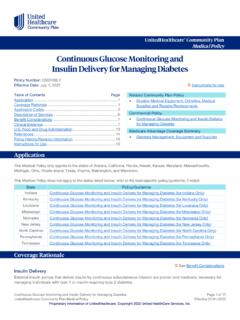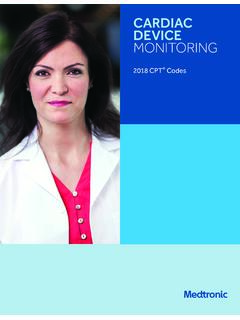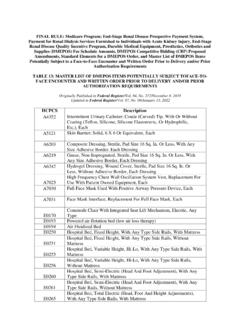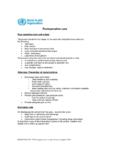Transcription of PATIENT SAFETY, RISK MANAGEMENT - Temple Health
1 PATIENT SAFETY & RISK MANAGEMENT FY 2023 PATIENT SAFETY, RISK MGMT- MANDATORY COMPETENCY FY 2023 1 Objective: To provide an overview of the organization s PATIENT Safety/Risk MANAGEMENT Program. Relevant Policy: PATIENT Safety Plan See also: MCARE Reporting Tutorial There are specific policies in each hospital which provide more detailed information about each of the topics below. The PATIENT Safety Plan provides an overview of all of these topics. Tutorial: EVENT REPORTING Employees/Physicians are the eyes and ears of the organization and have a responsibility to use sound PATIENT safety practices in caring for our patients . All employees/physicians are responsible for PATIENT safety. Every employee/physician has the following responsibilities when an untoward event occurs: First and foremost, take appropriate steps to care for the PATIENT and minimize negative outcomes.
2 Contact the PATIENT s attending physician to report the incident and implement any therapy or treatment ordered. Implement steps to contain the risk to others, as appropriate. Enter an incident report in the electronic incident reporting system (MIDAS system ). Take care of any family needs, as appropriate. Disclosure of the event by the appropriate care team to the PATIENT /family. Documentation of the event and the disclosure in the medical record. All members of the medical staff, house staff, and employees are required to report suspected and/or identified medical errors/events and should do so without the fear of reprisal/retaliation in relationship to their employment. A report of an event or hazard may be entered into the electronic event reporting system (MIDAS) with or without providing your name.
3 An orientation regarding how to complete an electronic incident report called a MIDAS RDE is provided by your immediate supervisor. If you require additional information or training regarding completion, contact the Risk MANAGEMENT Department at Temple University Hospital at 215-707-8219, at Episcopal & Northeastern Campuses at 215-707-0447, and at Jeanes Hospital at 215-728-3318 or 215-728-2393. MANDATORY STATE REPORTING OF EVENTS Pennsylvania PATIENT Safety Authority Reporting system (PA PSRS) The Commonwealth of Pennsylvania requires mandatory electronic reporting by all licensed Health care facilities of any incident or event that may be associated with or may be an actual PATIENT safety concern; and requires an automatic disclosure to PATIENT SAFETY & RISK MANAGEMENT FY 2023 PATIENT SAFETY, RISK MGMT- MANDATORY COMPETENCY FY 2023 2 patients and their families.
4 (The Medical Care Availability and Reduction of Error Fund ("Mcare") was created by Act 13 of 2002 ("Mcare Act") Events of interest to the Commonwealth are described as Incidents, Serious Events or Infrastructure Failures. What is an Incident? An incident is an event, occurrence, or situation involving the clinical care of a PATIENT in a medical facility which could have injured the PATIENT but did not either cause an unanticipated injury or require the delivery of additional Health care services to the PATIENT . The term does not include a serious event. What is a Serious Event? A serious event is an event, occurrence or situation involving the clinical care of a PATIENT in a medical facility that results in death or compromises PATIENT safety and results in an unanticipated injury requiring the delivery of additional Health care services to the PATIENT .)
5 The term does not include an incident. What is an Infrastructure Failure? An infrastructure failure is an undesirable or unintended event, occurrence or situation involving the infrastructure of a medical facility or the discontinuation or significant disruption of a service which could seriously compromise PATIENT safety. The Risk MANAGEMENT Departments make all determinations as to what occurrences are reported to the PATIENT Safety Authority. The law requires that any Health care worker who reasonably believes that a serious event has occurred with a PATIENT shall immediately report the event according to their facility s PATIENT safety plan and the incident reporting instructions listed above. In addition, if the facility discovers that a Licensed Health Care Provider has failed to report a serious event, then that facility may notify the licensing board of the failure to report by the licensed Health care provider.
6 Other Definitions Near Miss A near miss is a potential event that did not reach the PATIENT but did have the potential to harm the PATIENT . Staff should look to events that are preventable or reportable as situations (near misses) or opportunities that help staff learn about system failures. Sentinel Events (SE) Sentinel event is the term used by The Joint Commission for a serious event. A SE is defined as a PATIENT safety event that reaches a PATIENT and results in any of the following: o Death o Permanent harm o Severe temporary harm - critical, potentially life-threatening harm lasting for a limited time which no permanent residual, but requires transfer to a higher level of care/ monitoring for a prolonged period of time, transfer to a higher level of care for a life-threatening condition, or additional major surgery, procedure, or treatment to resolve the condition.
7 PATIENT SAFETY & RISK MANAGEMENT FY 2023 PATIENT SAFETY, RISK MGMT- MANDATORY COMPETENCY FY 2023 3 A SE signals a need for immediate investigation or response by the organization. Potential organizational responses to a SE may include performing a Root Cause Analysis (RCA) or Failure Mode and Effects Analysis (FMEA) to understand and prevent the issues that caused the SE. o Root Cause Analysis (RCA) is a structured method used to analyze serious adverse events after they have occurred. It may also be used to analyze a near miss. o Failure Mode and Effects Analysis (FMEA) is a systematic, proactive method for evaluating a process to identify where and how it might fail, and to assess the relative impact of different failures in order to identify the parts of the process that are most in need of change.
8 Staff regularly participate in RCA s and/or FMEA s. RCA s and FMEA s are needed for the organization to understand the underlying issues that may be involved in a SE. Never Events The National Quality Forum (NQF) identified over twenty-seven (27) medical events that are serious, largely preventable and of concern to both the public and Health care providers , as they should never happen. Examples include but are not limited to: wrong site surgery, pressure ulcer stages III and IV, surgical site infection after bariatric surgery for obesity, vascular-catheter associated infection, catheter-associated urinary tract infection, administration of incompatible blood, and foreign object unintentionally retained after surgery.
9 The Centers for Medicare and Medicaid (CMS) and some private insurance companies have adopted never-event payment policies, under which providers will not be reimbursed for procedures and treatments needed as a result of certain of these preventable errors occurring to a PATIENT in the hospital. SAFE MEDICAL DEVICE ACT (SMDA) Key Provisions of the Law A facility must report a death or serious injury due to a medical device failure or malfunction. A facility must report when it reasonably is suggested that a device has or may have caused or contributed to an injury. A facility must report to the Food and Drug Administration (FDA) within ten (10) working days. Civil and/or criminal penalties for failure to report may result.
10 Any medical device or equipment involved in an incident shall immediately be taken out of use, tagged out of service, and sequestered to be submitted to the Risk MANAGEMENT Department and/or the Bio-Medical Department. What types of SMDA events necessitate reporting? Any failure/malfunction of equipment. Any improper or inadequate design of devices that has led to a PATIENT /worker injury. Any manufacturing related problems. Labeling issues. PATIENT SAFETY & RISK MANAGEMENT FY 2023 PATIENT SAFETY, RISK MGMT- MANDATORY COMPETENCY FY 2023 4 Any User Error regarding equipment, supplies. Employees should report device related/equipment incidents through the electronic incident reporting system (MIDAS).







